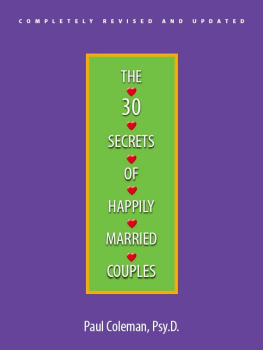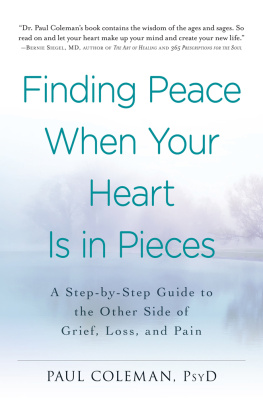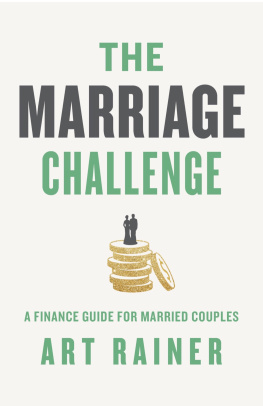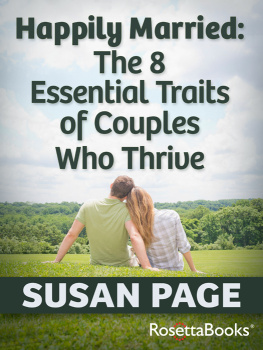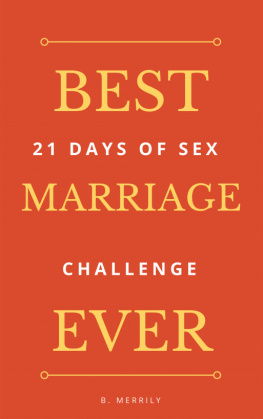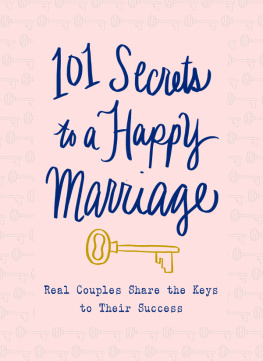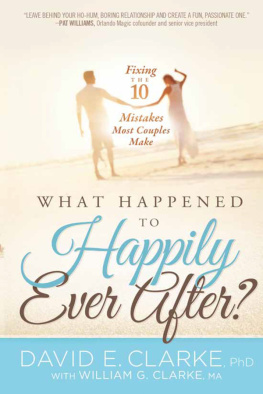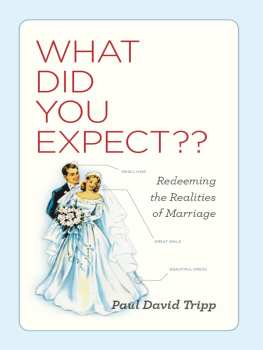
THE SECRETS OF
HAPPILY MARRIED
COUPLES
2nd Edition
Paul Coleman, Psy.D.

For my parents, George and Frances Coleman
Copyright 2006, 1992, Paul Coleman.
All rights reserved. This book, or parts thereof, may not be
reproduced in any form without permission from the publisher;
exceptions are made for brief excerpts used in published reviews.
Published by
Adams Media, an imprint of Simon & Schuster, Inc.
57 Littlefield Street
Avon, MA 02322
www.adamsmedia.com
ISBN 13: 978-1-59337-489-1
ISBN 10: 1-59337-489-5
Printed in Canada.
J I H G F E D C B
Library of Congress Cataloging-in-Publication Data
Coleman, Paul W.
The 30 secrets of happily married couples / Paul Coleman.2nd ed.
p. cm.
Includes bibliographical references.
ISBN 1-59337-489-5
1. Marriage. 2. Family. 3. Sex.
I. Title: Thirty secrets of happily married couples. II. Title.
HQ519.C65 2006
646.7'8dc22
2005026089
This publication is designed to provide accurate and authoritative information with regard to the subject matter covered. It is sold with the understanding that the publisher is not engaged in rendering legal, accounting, or other professional advice. If legal advice or other expert assistance is required, the services of a competent professional person should be sought.
From a Declaration of Principles jointly adopted by a
Committee of the American Bar Association and a Committee of Publishers and Associations
Many of the designations used by manufacturers and sellers to distinguish their product are claimed as trademarks. Where those designations appear in this book and Adams Media was aware of a trademark claim, the designations have been printed with initial capital letters.
This book is available at quantity discounts for bulk purchases.
For information, please call 1-800-289-0963.
Contents
Acknowledgments
A book such as this would not be possible if not for the dedicated work of many researchers in the field of marital therapy.
In particular, I am most grateful for the research conducted by Dr. John Gottman and Dr. Howard Markman, whose work has inspired me and whose research findings are well represented on these pages.
Thanks again to my literary agent, Mike Snell, whose talent, enthusiasm, and bluefish pat are second to none.
Many thanks for the fine work by the editors at Adams Media, notably Danielle Chiotti.
To my friend Dr. Foster Malmed, who never fails to crack me up.
To my longtime friends Norb and Gail Gottschling, Dr.
Arnie Morgan and Alycia Morgan, Dr. Mike Leahy, and Deni OHara.
To Tony and Kate Burdick who are role models for many on how to make your marriage not only happy, but sacred.
Of course, many thanks to my wife Jody for her love and encouragement.
And a special thanks to Luke, Anna, and Julia, who reminded me of my priorities when they insisted I read them a story instead of write.
Whats New and Exciting in This Updated Version?
About a dozen years have passed since I first wrote The 30Secrets of Happily Married Couples. During that time, new research findings have changed the way many counselors conduct relationship therapy. Therapy today is much more active, and therapists have changed some of their ideas on what really makes a relationship work. For instance:
Old Myth: Shutting down and running away from an argument is never helpful.
New Finding: If agitation is high, a strategic timeout from an argument is essentialas long as the discussion continues when participants are calmer.
Old Myth: Happy couples show much more positive emotions when they interact (humor, affection, agreement, and so on) than do unhappy couples.
New Finding: In a study of newlyweds, couples who later divorced or felt miserable together showed only thirty seconds per day less positive emotion than their happier counterparts.
But the happier couples used those extra thirty seconds like a precision laser beam in the service of de-escalating conflict.
Old Myth: Couples who avoid conflict are suppressing their real feelings and building resentments.
New Finding: Couples who try to avoid arguments at all costs can actually be very happy together. However, if a conflictavoider is paired with someone who is emotionally volatile, unhappiness will result.
Old Myth: If you cannot resolve your differences you are doing something wrong and the relationship is at risk for failure.
New Finding: Every couple has several permanently irresolvable differences because of personality styles and values. Happy couples learn to manage those differences, not eradicate them.
Old Myth: Major differences in personality account for why some couples are unhappy together.
New Finding: Personality differences do not predict marital success or failure. It is each partners perception and interpretation of those personality traits that make the most difference.
Old Myth: It is important to make I statements, not You statements, when communicating (I felt hurt when you teased me in front of our friends as opposed to You were wrong to tease me in front of our friends).
New Finding: I statements are unnatural and hard to do under stress. Happy couples find other ways to communicate effectively.
As a result of those and other new findings, I eliminated over half of the original secrets and replaced them with brand new insights. All of the remaining chapters have been completely updated and expanded.
Part One reveals fifteen positive steps couples should take to increase marital quality. It lists the key actions and attitudes that couples need to do more of to improve marital joy. Part Two lists the fifteen negative behaviors and attitudes that must be reduced. Reducing negative interactions and increasing positive ones is vitally important in a marriagebut for different reasons. Negative behaviors and attitudes must be reduced because they are costly. One negative interactioneven a small argument or a misperceptioncosts between five and ten positive interactions. However, couples that break many of the new relationship rules will survive if their ratio of positive to negative interactions is at least 5:1 according to Dr. John Gottman at the University of Washington. If a couple manages to have few negative moments but few positive ones as well, the marriage may feel a little flat. Positive interactions give life to a relationship.
If youve already read the previous edition of this book Im sure youll be pleased at the multitude of new tips and strategies you will now have at your disposal. To the new readers I say thanks for putting your faith in me. This book wont let you down.
Paul Coleman, Psy.D.
Take the Happiness Test
Have you ever been to a restaurant and noticed (perhaps with envy and a bit of nostalgia) that couple who seem just crazy about each other? Those romantics who devise ways to hold hands during the appetizer, lay bare their souls in intimate conversation over dinner, smile warmly and tenderly throughout the evening, and generally gaze upon one another with rapture?
Those were the days. Remember? You dont have to be unhappy in your marriage to wish it could be happier. You can have a committed, caring relationship but still be weary of complacency, frustrated with your partners personality quirks, and secretly wondering, Wouldnt it be wonderful if hed only...
Next page
